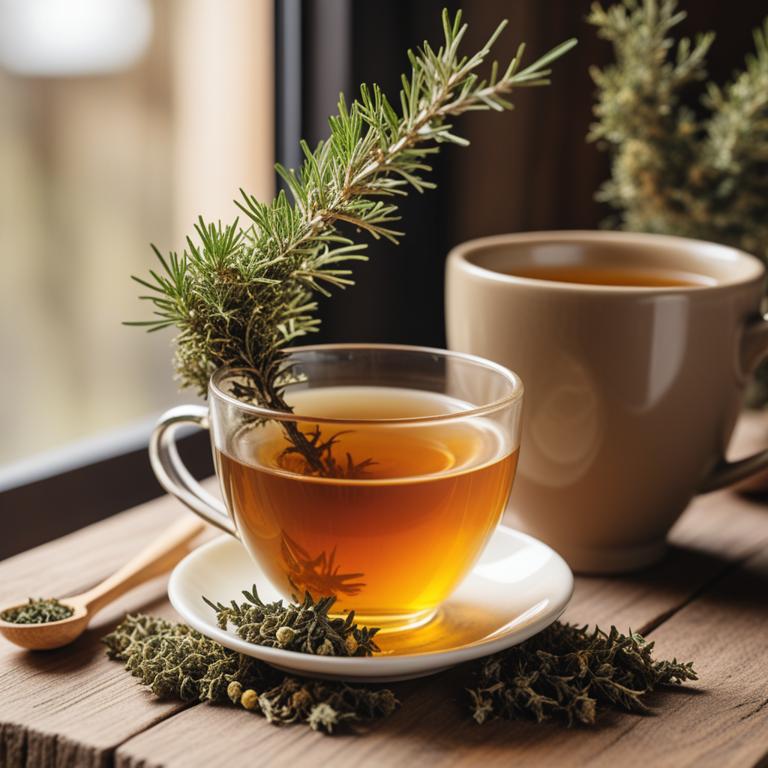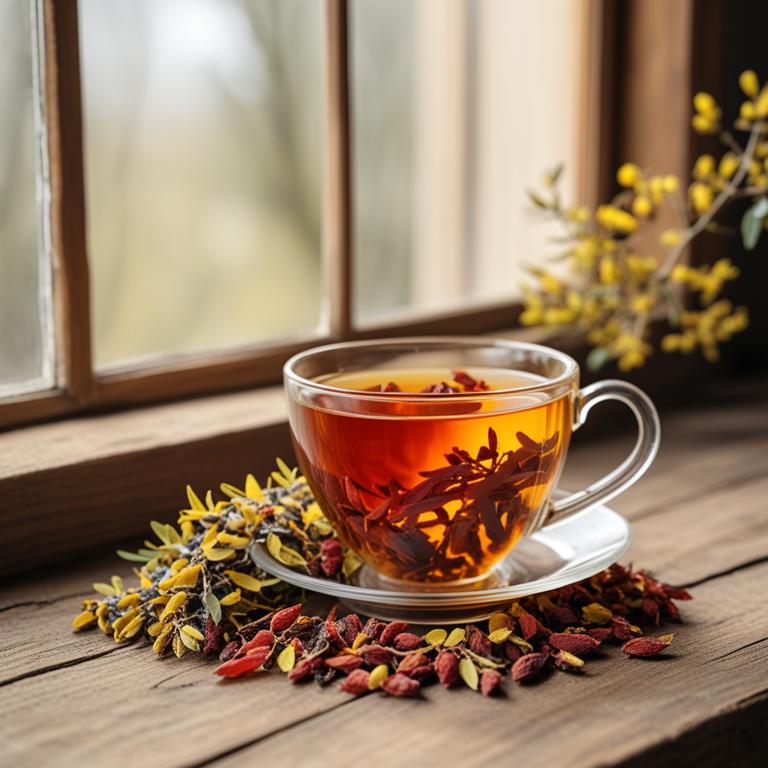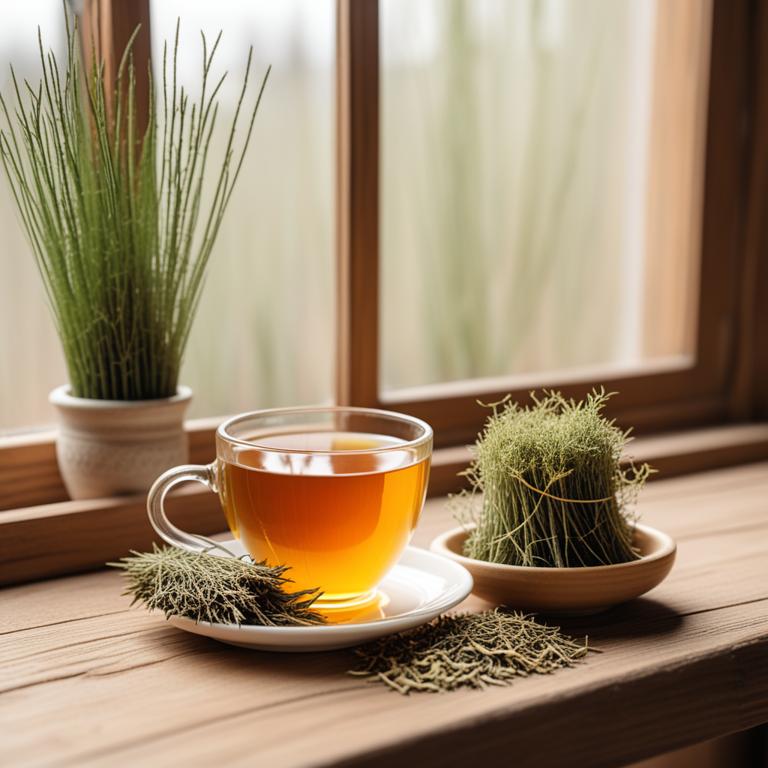9 Herbal Teas For Bladder Infection

Herbal teas can be a great natural remedy to help alleviate the discomfort of a bladder infection.
When you drink these teas, the herbs work to reduce inflammation and fight off the bacteria causing the infection. Juniperus communis, also known as juniper berries, is one herb that's often used for this purpose. The berries contain compounds that have anti-inflammatory properties, which can help soothe the bladder and reduce pain. Echinacea purpurea is another herb that's commonly used to boost the immune system, helping the body fight off infections more efficiently. By drinking Echinacea tea, you can support your body's natural defenses and reduce the severity of your symptoms.
Achillea millefolium, or yarrow, is also a natural anti-inflammatory that can help ease the discomfort of a bladder infection. The herb contains flavonoids and terpenes that can help reduce inflammation and ease pain. Drinking yarrow tea may also help to prevent future bladder infections by promoting healthy digestion and reducing the risk of bacterial growth in the urinary tract. Drinking herbal teas for bladder infections can bring several benefits to your life. Not only can they help alleviate symptoms and promote healing, but they can also be a more natural and gentle alternative to antibiotics. By choosing herbal teas, you can avoid the potential side effects of medications and support your body's natural ability to heal itself.
Additionally, many herbal teas are rich in antioxidants, which can help to protect your body from further damage and promote overall health.
- 1. Juniperus communis
- 2. Echinacea purpurea
- 3. Achillea millefolium
- 4. Sambucus nigra
- 5. Glycyrrhiza glabra
- 6. Berberis vulgaris
- 7. Equisetum arvense
- 8. Melissa officinalis
- 9. Hypericum perforatum
1. Juniperus communis

Juniperus communis teas contains a compound called terpinen-4-ol, which has antimicrobial properties that help fight off bacteria causing bladder infections.
The tea also contains flavonoids, specifically rutin, that have anti-inflammatory properties, which can help reduce swelling and discomfort associated with bladder infections. The terpinen-4-ol in Juniperus communis teas can also help increase urine production, which can help flush out bacteria from the urinary tract. The diuretic properties of the tea can also help reduce the concentration of bacteria in the urine, making it less likely to cause an infection.
Juniperus communis teas' flavonoids may also help reduce the risk of bacterial adhesion to the bladder and urinary tract walls.
- Gather 1 cup of dried Juniperus communis berries.
- Combine 1 cup of berries with 4 cups of water in a pot.
- Bring the mixture to a boil, then reduce heat and simmer for 10 minutes.
- Strain the liquid into a separate container. Discard the solids.
- Drink 1 cup of the tea 3 times a day to help alleviate bladder infection symptoms.
2. Echinacea purpurea

Echinacea purpurea teas contains compounds like alkylamides and caffeic acid, which have anti-inflammatory properties that help reduce swelling and discomfort in the urinary tract.
The tea's phenolic acids, such as quinic acid and kaempferol, also exhibit antimicrobial activity, inhibiting the growth of bacteria that can cause bladder infections. The polysaccharides present in Echinacea purpurea stimulate the immune system, increasing the production of white blood cells that fight off infections. The flavonoids and rosmarinic acid in the tea have antioxidant properties, which help protect the bladder and urinary tract from damage caused by free radicals.
By reducing inflammation, inhibiting bacterial growth, and stimulating the immune system, Echinacea purpurea teas may provide relief from bladder infection symptoms.
- Gather 2 tablespoons of dried Echinacea purpurea roots and flowers.
- Boil 1 cup of water in a pot.
- Add the dried Echinacea purpurea to the boiling water.
- Reduce heat and let it simmer for 5-7 minutes.
- Strain the tea and drink 1 cup 2-3 times a day.
3. Achillea millefolium

Achillea millefolium teas contains bioactive constituents like apigenin, luteolin, and chamazulene, which are known for their anti-inflammatory and antimicrobial properties.
These compounds help reduce inflammation in the urinary tract and fight off bacteria that cause bladder infections. The tea's antiseptic properties also prevent the growth of bacteria and other pathogens that can lead to infection. The diuretic properties of Achillea millefolium tea help flush out the urinary tract, reducing the risk of infection and promoting healing.
By reducing inflammation and eliminating bacteria, Achillea millefolium tea provides a natural and effective way to combat bladder infections.
- Gather 1 cup of fresh Achillea millefolium leaves or 2 tablespoons of dried leaves.
- Heat 1 cup of water in a pot and bring it to a boil.
- Add the gathered leaves to the boiling water and reduce heat to low.
- Steep the mixture for 5-7 minutes, then strain the liquid into a cup.
- Drink the tea 2-3 times a day to help relieve bladder infection symptoms.
4. Sambucus nigra

Sambucus nigra teas contains bioactive constituents like flavonoids, phenolic acids, and anthocyanins.
These compounds have antimicrobial and anti-inflammatory properties, which help combat bacterial infections in the bladder. Flavonoids, specifically quercetin and kaempferol, have been shown to inhibit the growth of bacteria such as E. coli, a common cause of bladder infections. Anthocyanins, responsible for the tea's antioxidant properties, help reduce oxidative stress and inflammation in the bladder, promoting a healthy environment.
By targeting bacterial growth and reducing inflammation, Sambucus nigra teas can help alleviate symptoms and support the body's natural healing process.
- Gather 25g of dried Sambucus nigra flowers. You can buy them from a health store or online.
- Measure 1 cup of boiling water and pour it over the dried flowers in a heat-resistant cup.
- Steep the flowers for 5-7 minutes. You can let it steep for a bit longer if you prefer a stronger tea.
- Strain the tea into another cup using a fine-mesh sieve or cheesecloth. Discard the flowers.
- Drink 1 cup of the Sambucus nigra tea, 3-4 times a day, for relief from bladder infections.
5. Glycyrrhiza glabra

Glycyrrhiza glabra teas contains glycyrrhizin, a triterpenoid saponin that has anti-inflammatory properties.
Glycyrrhizin helps reduce inflammation and swelling in the urinary tract, which can contribute to bladder infections. Licorice root, the source of glycyrrhizin, also contains flavonoids, such as liquiritin and isoliquiritin, which have antimicrobial properties that can help combat bacterial infections. The anti-inflammatory and antimicrobial properties of glycyrrhizin and flavonoids in Glycyrrhiza glabra teas can help alleviate symptoms of bladder infections, such as pain and discomfort.
By reducing inflammation and fighting off bacteria, Glycyrrhiza glabra teas can help promote healing and recovery in the urinary tract.
- Get 1 cup of water and boil it.
- Take 1 teaspoon of dried Glycyrrhiza glabra roots and add it to the boiling water.
- Reduce heat and let it simmer for 5 minutes.
- Strain the liquid and discard the roots.
- Drink the tea 2-3 times a day, or as directed by a healthcare professional.
6. Berberis vulgaris

Berberis vulgaris teas contains a key compound called berberine, which has antimicrobial properties that help fight off bacterial infections.
Berberine inhibits the growth of bacteria like E. coli, which often cause bladder infections. Berberis vulgaris teas also contains alkaloids, such as berbamine and oxyacanthine, which have anti-inflammatory properties that reduce swelling and discomfort in the bladder. The diuretic properties of berberine help increase urine production, flushing out bacteria and toxins from the bladder.
By reducing bacterial growth and inflammation, Berberis vulgaris teas may help alleviate the symptoms of bladder infections.
- Gather 1 cup of fresh Berberis vulgaris berries, 2 cups of boiling water, and a teapot.
- Rinse the Berberis vulgaris berries and add them to the teapot.
- Pour the boiling water over the Berberis vulgaris berries and let it steep for 5-7 minutes.
- Strain the mixture and discard the berries. Add honey to taste, if desired.
- Drink 1/2 cup of the tea, 3 times a day, for up to 7 days. Consult a doctor before using this remedy.
7. Equisetum arvense

Equisetum arvense teas contains bioactive constituents like silicic acid, flavonoids, and tannins.
These compounds have anti-inflammatory properties, which help reduce swelling and pain in the bladder area. The silicic acid in Equisetum arvense teas also acts as a natural diuretic, increasing urine production to flush out bacteria causing infections. Additionally, the flavonoids and tannins have antimicrobial properties, which help combat the growth of harmful bacteria in the urinary tract.
By drinking Equisetum arvense teas, individuals may experience relief from bladder infection symptoms due to its ability to reduce inflammation and promote healthy urine production.
- Gather 2 tablespoons of dried Equisetum arvense root and a cup of water.
- Place the root in a saucepan and add the cup of water.
- Bring the mixture to a boil over medium heat, then reduce heat and simmer for 10-15 minutes.
- Strain the mixture into a cup and discard the root. Let it cool.
- Drink the tea 2-3 times a day for relief from bladder infection symptoms.
8. Melissa officinalis

Melissa officinalis teas contains compounds like rosmarinic acid, caffeic acid, and linalool, which give it antibacterial and anti-inflammatory properties.
These properties help to reduce inflammation in the bladder and kill off bacteria that can cause infections. The anti-inflammatory properties of Melissa officinalis teas also help to soothe the bladder and reduce pain and discomfort. Additionally, the teas' antimicrobial properties help to prevent the growth of bacteria in the urinary tract, reducing the risk of infection.
The combination of antibacterial and anti-inflammatory properties in Melissa officinalis teas makes it a potential treatment option for bladder infections.
- Gather 1 cup of fresh Melissa officinalis leaves or 1 teaspoon of dried leaves.
- Boil 1 cup of water in a pot.
- Add the Melissa officinalis leaves to the boiling water and let it steep for 5-7 minutes.
- Strain the tea and discard the leaves.
- Drink 1-2 cups of the tea, 2-3 times a day, to help alleviate bladder infection symptoms.
9. Hypericum perforatum

Hypericum perforatum teas contains bioactive constituents like flavonoids and naphthodianthrones.
These compounds have anti-inflammatory and antimicrobial properties that help combat bacterial infections. The flavonoids in Hypericum perforatum tea, particularly quercetin and kaempferol, have been shown to inhibit the growth of bacteria that cause urinary tract infections. The naphthodianthrones, particularly hyperforin and adhyperforin, have been found to have antibacterial and antiseptic properties, which can help alleviate bladder infections.
The combination of these compounds in Hypericum perforatum tea may help reduce inflammation, kill bacteria, and promote healing in the bladder.
- Gather 2 tablespoons of dried Hypericum perforatum flowers.
- Heat 1 cup of water in a pot.
- Pour the hot water over the dried flowers in a cup.
- Steep for 5-7 minutes, then strain the mixture.
- Drink the tea 2-3 times a day to help relieve bladder infection symptoms.